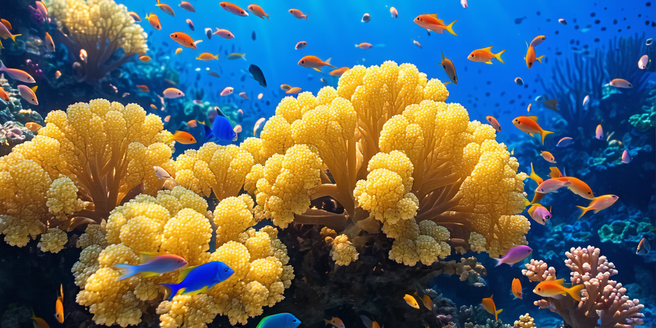
Understanding Coral Reefs and Their Ecosystems
Coral reefs are vibrant underwater ecosystems that harbor immense biodiversity. They provide habitat, food, and protection for countless marine species. Corals are tiny animals called polyps, living in colonies and producing calcium carbonate to form the reef’s complex structure. These ecosystems play a crucial role in maintaining ocean health by stabilizing the sea floor and protecting coastlines from erosion. They also support human communities by contributing to local economies through tourism and fisheries. However, coral reefs are sensitive to environmental changes, making them indicators of ocean conditions. The intricate relationships within these ecosystems mean any disruption can have far-reaching effects. Understanding these interconnections is essential for grasping the importance of coral reefs and emphasizing the need for their preservation and restoration.
The Impact of Climate Change on Coral Health
Climate change poses a significant threat to coral health, primarily through the increase in sea surface temperatures. Corals have a symbiotic relationship with zooxanthellae, algae that provide nutrients through photosynthesis. Elevated temperatures cause stress and lead to coral bleaching, where corals expel these algae, losing their color and primary food source. Prolonged bleaching events can result in coral mortality, drastically affecting the ecosystem. Moreover, climate change also leads to ocean acidification as increased carbon dioxide is absorbed by seawater, reducing the calcification ability of corals. This weakens the reef structure, making it more susceptible to damage. Understanding the impact of climate change on coral health highlights the urgency of reducing greenhouse gas emissions and implementing measures to adapt and protect these vital ecosystems.
The Role of Ocean Temperatures in Reef Degradation
Rising ocean temperatures are a primary driver of coral reef degradation. Corals are highly sensitive to temperature changes and thrive within a narrow temperature range. When temperatures exceed this range, corals experience stress, triggering bleaching events. Bleached corals are deprived of essential nutrients provided by their symbiotic algae, leading to weakened health and increased susceptibility to disease. The frequency and severity of bleaching events have increased with global warming, causing widespread damage and loss of coral species. This alteration in ocean temperatures not only impacts coral health directly but also disrupts the delicate balance of the entire reef ecosystem. Addressing global warming by mitigating greenhouse gas emissions is crucial in halting the trend of rising ocean temperatures and preserving coral reefs.
How Severe Weather Events Accelerate Coral Damage
Severe weather events, such as hurricanes and cyclones, can drastically accelerate coral reef damage. These intense storms cause physical destruction to reef structures through high wave energy, breaking apart coral formations and uprooting colonies. In addition to physical damage, storms can contribute to sedimentation, which smothers corals and blocks sunlight, further inhibiting their growth and survival. The increased occurrence and intensity of these weather events are linked to climate change, posing a compounded threat to coral reefs that are already stressed by rising water temperatures and acidity levels. Understanding the impact of severe weather on coral reefs highlights the urgency of strengthening climate resilience measures and implementing conservation strategies to preserve these vital ecosystems.
Human Activities and Their Influence on Reef Conditions
Human activities significantly influence reef conditions, often exacerbating the degradation process. Coastal development leads to habitat destruction and increased sedimentation, hindering coral growth. Overfishing disrupts the ecological balance of reef ecosystems, removing key species that maintain coral health. Pollution, including agricultural runoff and plastic debris, introduces toxins and nutrients that promote harmful algal blooms smothering corals. Furthermore, anchoring and tourism activities cause physical damage to reefs. These human-induced pressures compound the impacts of climate change, accelerating coral decline. Addressing the human influence on reef conditions requires implementing sustainable practices, enforcing strict regulations, and raising awareness about the importance of preserving coral reefs for future generations.
Strategies for Protecting Coral Reefs Amidst Weather Changes
Protecting coral reefs amidst weather changes requires implementing comprehensive strategies focused on resilience and conservation. Establishing marine protected areas helps safeguard critical reef habitats from human activities, allowing ecosystems to recover and thrive. Restoration efforts, such as coral gardening and transplantation, aid in replenishing damaged reefs. Enhancing community engagement and education programs promote sustainable practices and raise awareness about the reefs’ importance. Additionally, reducing local pollution through effective waste management and regulating coastal development are vital for minimizing stress on coral ecosystems. Ultimately, concerted global efforts to mitigate climate change are crucial, addressing the root causes of rising temperatures and severe weather phenomena threatening coral reefs. Through these strategies, we can help protect and sustain these vital marine ecosystems for future generations.
